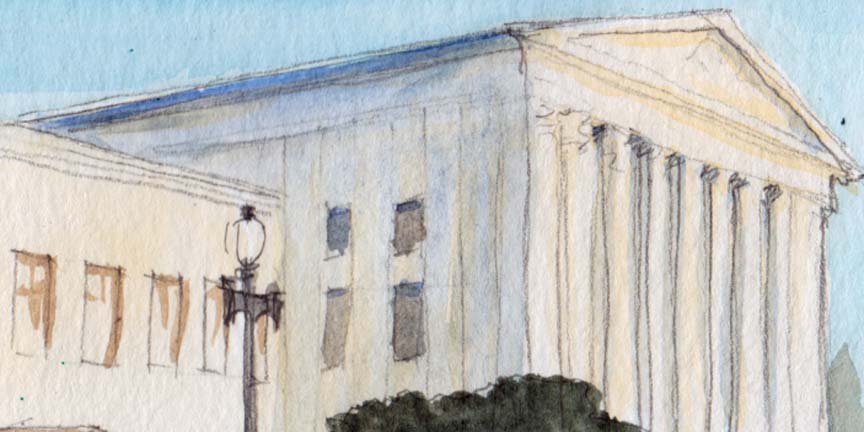Friday round-up

on May 24, 2019 at 6:10 am

Subscript Law has a graphic explainer for Monday’s decision in Herrera v. Wyoming, in which the court held that a hunting right granted to the Crow Tribe under an 1868 treaty is still valid. At Dorf on Law, Michael Dorf writes that “on remand Wyoming can prevail by [showing] that enforcement of its law without exceptions for people like Herrera is necessary to serve the state’s interest in conservation”; he “contrast[s] that proposition with the operative constitutional rule for free exercise claims,” noting that “the Court construes the First Amendment’s Free Exercise Clause not to require religious exceptions, while it construes treaty rights to require exceptions (absent a showing of necessity).”
At Michael Best, James Lawrence III and Joseph Olson look at this week’s decision in Merck Sharp & Dohme v. Albrecht, in which the court held that whether the FDA would have rejected a proposed change to a prescription drug label, pre-empting a state-law claim for failure to warn of the drug’s risks, is a question of law for a judge to decide. For The National Law Journal (subscription or registration required), Tony Mauro reports that the court’s decision in Merck “gave both sides partial victories and has touched off a furious last-minute dispute in a similar drug case involving the suicide of a Reed Smith partner that the justices [were] set to consider Thursday.”
Briefly:
- At Newsweek Roger Parloff reports that to decide Google LLC v. Oracle America Inc., a cert petition involving whether copyright protection extends to software interfaces, “the Supreme Court [would] have to look closely at exactly what an application program interface is.” [Disclosure: Goldstein & Russell, P.C., whose attorneys contribute to this blog in various capacities, is among the counsel to the petitioner in this case.]
- Tony Mauro reports at The National Law Journal (subscription or registration required) that Justice Neil Gorsuch’s law-clerk hiring practices “display his outside-the-box approach,” observing that “[i]n upcoming terms, at least three of [Gorsuch’s] law clerks will be drawn from the ranks of legal academia, not the most common source of Supreme Court clerk talent.”
- In an op-ed for The New York Times, Linda Greenhouse hopes Americans won’t “lose the Establishment Clause from our working civic vocabulary”; she notes that “before the end of the current term, we will have a better idea of whether there’s anything left of the Establishment Clause when the court decides the pending case on the constitutionality of a 40-foot cross on public land in Maryland,” in which one side essentially argues that “the Establishment Clause permits any religious favoritism short of actual coercion of non-adherents.”
- At Florida Court Review, John Cavaliere provides updates on Florida’s execution of Robert Joe Long, who was put to death yesterday after the Supreme Court, with no noted dissents, denied Long’s applications for a stay.
- At Final Decisions, Bryan Lammon observes that in arbitration case Lamps Plus Inc. v. Varela, “the Court elided an issue that has split the courts of appeals for years: whether a district court must stay an action—not dismiss it—after ordering arbitration”; he adds that “had the Court resolved it and held that stays are required, it would have had to dismiss Lamps Plus for lack of jurisdiction.”
- At Justia’s Verdict blog, Vikram David Amar discusses the court’s approach to precedent in Franchise Tax Board of California v. Hyatt, arguing that “[i]f the Court, going forward, makes more clear that it is serious about protecting real reliance—by which I mean protecting people who not only expected a ruling to persist but who acted such that they would be worse off today if the mistaken ruling were fixed than they would have been if the mistaken ruling had never come down—then stare decisis doctrine will do its job.”
We rely on our readers to send us links for our round-up. If you have or know of a recent (published in the last two or three days) article, post, podcast, or op-ed relating to the Supreme Court that you’d like us to consider for inclusion in the round-up, please send it to roundup [at] scotusblog.com. Thank you!


